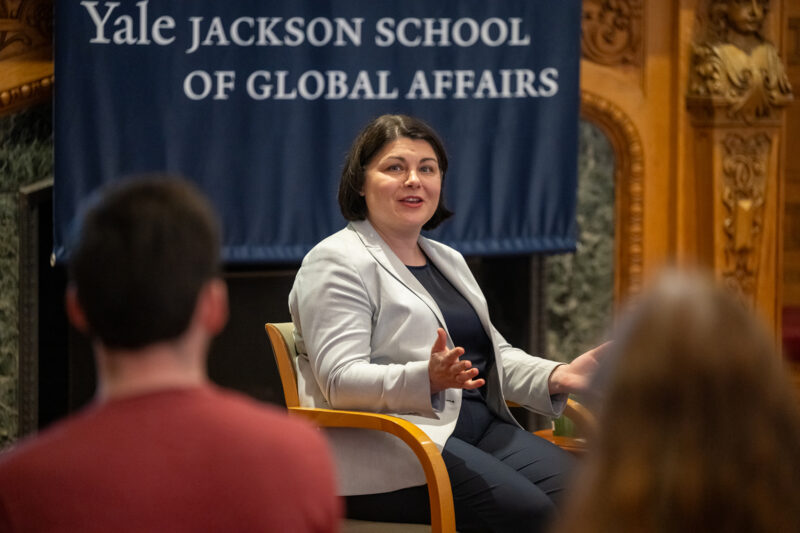When the Russian invasion of Ukraine began in early 2022, few thought such a large-scale war could be waged on the European continent — including Ukraine’s neighbor, the small nation of Moldova.
“In retrospect, perhaps it was wishful thinking, but we really didn’t believe it would happen until the last moment,” said Natalia Gavrilița, who served as prime minister of Moldova from August 2021 to February 2023.
Gavrilița visited the Jackson School of Global Affairs on October 26 to discuss the challenges Moldova has faced throughout the conflict in Ukraine and the future of her country. The conversation was moderated by Alix Peterson Zwane, Senior Fellow at the Jackson School and CEO of the Global Innovation Fund.
Moldova is a country of just 2.5 million people — about the population of the nearby Ukrainian city of Odessa. It shares much of its cultural identity — including its language — with Romania, but sits along a 700-mile border with Ukraine. A significant portion of that border, Gavrilița explained, is not controlled by the Moldovan government; the Transnistria region is an unrecognized breakaway state under military occupation by Russia since the early 1990s. Moldova is also heavily reliant on Russian oil and natural gas for energy.
Altogether, “it creates a very difficult position for Moldova,” said Gavrilița, who added that corruption by Moldovan oligarchs and politicians and the COVID-19 pandemic contributed to a challenging tenure as prime minister. (In Moldova, the president shares executive power with the Council of Ministers, which is led by the prime minister who is designated by the president.)
But in the face of these “overlapping crises,” Moldova has been able to make a push forward, Gavrilița said. Although it’s the second poorest country in Europe, Moldova has seen its economy expand by an average of 5% annually in the past two decades, according to The World Bank. Current President Maia Sandu campaigned on an anti-corruption platform, seeking to end Russian influence in Moldovan politics. And, to that end, Gavrilița said Moldova is making a significant shift to renewable energy to end the reliance on Russian energy.
“I’m proud of how we’ve dealt with these crises,” said Gavrilița of her time in office. “Moldova is a small country with a big heart.”
The next hurdle for Moldova to clear, Gavrilița said, is joining the European Union (EU), a move that she said most Moldovan citizens support. The EU granted the country candidate status in 2022 and is providing humanitarian aid to Moldovans who have been affected by the war in Ukraine. President Sandu set a target date of 2030 for accession to the EU, which will require measures such as strengthening the country’s economy, reducing corruption, and improving energy efficiency — all of which are in progress.
Given its unique geographic and geopolitical position, Gavrilița sees far-reaching implications for Moldova’s development.
“We are in a global fight between liberalism and an authoritarian model,” she said, “and we are starting to draw these lines where countries and people have to choose their model of development. It’s not unlike the 1990s, when the Soviet Union collapsed.
“We are now drawing the lines for the next generation and it’s important for Western liberal democracies to remain strong and united.”
